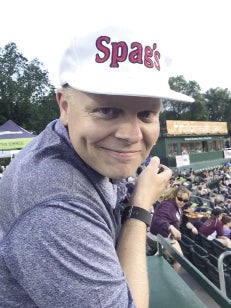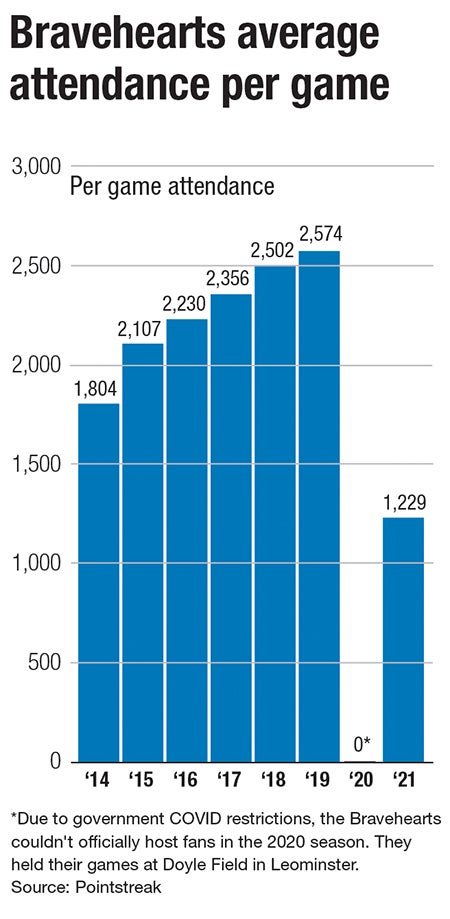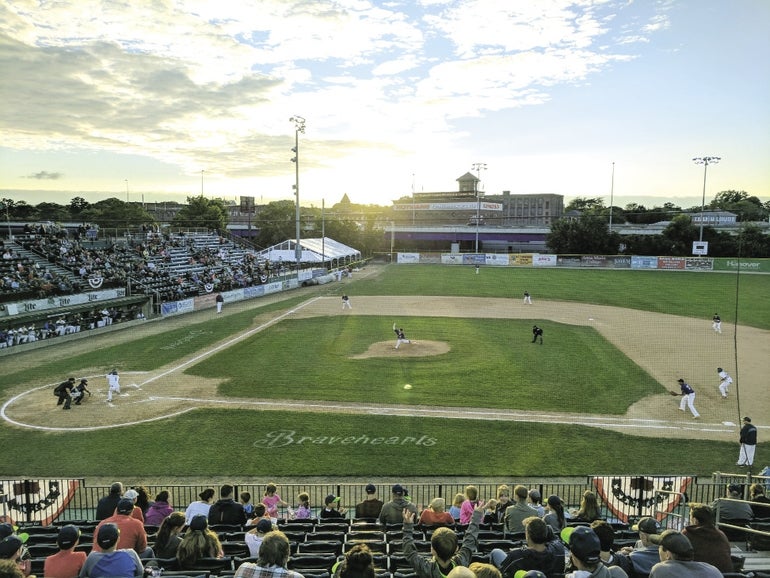In 2021, the Bravehearts averaged 1,229 fans per game, less than half of that of 2019. A major contributor to this slough was the inability to sell group tickets to businesses and schools, due to remote work and learning.
Get Instant Access to This Article
Subscribe to Worcester Business Journal and get immediate access to all of our subscriber-only content and much more.
- Critical Central Massachusetts business news updated daily.
- Immediate access to all subscriber-only content on our website.
- Bi-weekly print or digital editions of our award-winning publication.
- Special bonus issues like the WBJ Book of Lists.
- Exclusive ticket prize draws for our in-person events.
Click here to purchase a paywall bypass link for this article.
The Worcester Bravehearts have been placed in a precarious position. The Worcester Red Sox, their chief competitor, have dominated Worcester's cultural, economic, and political actions and discussions since the Boston Red Sox affiliate announced in 2018 their intention to move to Worcester. The $160-million public ballpark the City of Worcester built for the team can attest to that.
Concurrently, the Bravehearts, Worcester’s only summer collegiate baseball team since their first season in 2014, suffered through the coronavirus pandemic. No game tickets could be sold in 2020, and their attendance averages dropped dramatically in 2021; the same year the WooSox opened doors for their inaugural season.
“It's wildly unfortunate for the [Bravehearts] that the government decided to invest $160 million into their competitor,” said Victor Matheson, a sports economist and professor at College of the Holy Cross in Worcester. “In a lot of places, the way you make it, is that you’re the only game in town.”
But in the midst of all this fanfare, the Bravehearts remain hopeful for their upcoming season, and they have envisioned a new business model to persist along their Triple-A competitor.
Attendance woes

“If you took a look at our trajectory, over the first nine years, you would see steady growth from 2014, all the way to 2019,” said Dave Peterson, general manager of Bravehearts. “Just like every other small business, we took it on the chin in 2020.”
The Bravehearts averaged 2,574 fans per game by the end of the 2019 season, making them the sixth-most attended futures collegiate baseball team in the country. While they did have a 2020 season, no fans could attend games, and sponsorships were limited. This left the Bravehearts’ main revenue option being summer youth baseball camps, said Peterson.
In 2021, the Bravehearts averaged 1,229 fans per game, less than half of that of 2019. A major contributor to this slough was the inability to sell group tickets to businesses and schools, due to remote work and learning. Moreover, the WooSox played their first season in Worcester.

The WooSox averaged 6,145 fans per game in their inaugural season, ranking sixth among the 120 minor league baseball teams. WooSox General Manager Dan Rea told WBJ in October while the team was pleased with the attendance, the team felt the numbers were depressed by COVID restrictions, and the WooSox anticipate increasing attendance in 2022.
As for the Bravehearts, Peterson is hopeful for attendance numbers to increase in the future, but he did offer caution.
The WooSox have “forced us to change our business model in order to compete, because if we are not differentiating our product, we probably will lose,” said Peterson.
A need for change
With the Bravehearts no longer being the only baseball team in town and the need for differentiating becoming an utmost priority, the Bravehearts decided a new business model must be adopted to continue to thrive.
Last November, four employees of the Bravehearts visited the Savannah Bananas, a summer collegiate baseball team based in Georgia. The Bananas adopted an entertainment business model, straying away from what is perceived as typical in traditional baseball. Peterson, who has been in the local baseball scene since his tenure as emcee for the former Worcester Tornadoes, said seeing this model at play created a new vision for the Bravehearts.
The visit “opened our eyes to how the Bravehearts can be different,” said Peterson. “How we don’t have to be baseball, we can focus on entertainment. … We’re going to push the limits of everything that people have come to expect at a baseball game.”
In the past, the team focused more on the traditional side of baseball, but fan and community involvement was still integral. This primarily consisted of mascot promotions and other fan services during games, and in the off season this included school visitation, such as reading to children and pen-pal programs. The new model aims to expand upon this, both on and off season.
This new entertainment and fan-oriented model will correspond with the launch of the Bravehearts’ Twenty-Twenty-You promotional campaign, an effort to run through the entire season, which starts May 26. The campaign hopes to create a platform where fans, particularly children and families, can have a say in matters that they normally wouldn’t be able to, such as promotions from designing the jerseys to making the rules for select games.
This model is designed to make the games more of a show than a traditional ballgame, but Peterson did emphasize it will not interfere with the competitiveness of the sport.
“I'm not going to get in the way of the competitive nature of baseball. But I am definitely going to enhance it with ridiculous stuff going on in the background, so that people who are going to go to work the next day will tell their co-workers about it because they've never seen anything like it before,” Peterson said.

To advertise this new initiative, the Bravehearts have introduced more mass media involvement. This includes marketing through social media platforms, and in particular, a further emphasis on video production. The video production investments will allow the team to have a far greater reach, as they can continue to broadcast both online and on the New England Sports Network, as they did in the 2020 season. This media plan has created several new positions at the Bravehearts, including both an operations manager and a director of media.
These business measures have been especially beneficial for sponsorships, said John Creedon Jr., president and owner of the team. With support from the Better Business Bureau, the Bravehearts have been reaching out to small businesses throughout Greater Worcester to pitch their new model. According to Peterson, they have signed 16 new sponsorships for this season so far, an increase he primarily contributes to the new campaign.
A competitive future

Even with these new investments, Matheson, the Holy Cross professor, remains skeptical about the future of the Bravehearts.
The primary reason collegiate and minor-league teams survive is by offering a more inexpensive alternative to professional leagues, he said. The WooSox have filled this position, as an alternative to the Boston Red Sox, placing the Bravehearts in an indiscernible market.
Furthermore, while Matheson did maintain that entertainment programs have been successful in the past, nothing prevents them from being co-opted by their competitors, rendering the Bravehearts’ efforts null.
“There’s nothing stopping the WooSox from stealing any of the promotions that tend to work, and leaving out the ones that don’t,” Matheson said.
Regardless of the uncertain future, both Creedon and Peterson remain confident in the Bravehearts’ longevity.
“If we do this the way it's supposed to be done, and we turn this into a show, we will be selling out Fitton Field almost every single night over the course of the summer,” said Peterson. “And I firmly believe that in five years, we’re going to be millionaires.”

